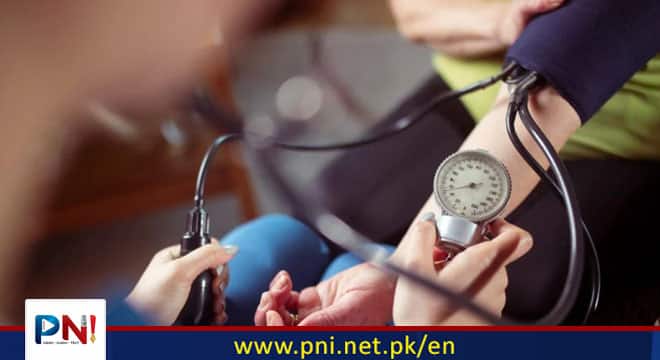ISLAMABAD, SEP 27 (ONLINE): High blood pressure in adolescents is associated with an increased risk of cardiovascular events later in life, according to a study published today in the Annals of Internal Medicine.
Researchers from Umeå and Uppsala Universities evaluated the medical records of 1,366,519 men who enlisted in the Swedish military between 1969 and 1997.
Military conscription in Sweden was mandated by law for all male citizens, making this a nationwide study. The scientists excluded around 2% of males due to chronic illness or disability.
Their blood pressure reading at enlistment was considered the baseline reading.
The researchers used the American College of Cardiology and the American Heart Association guidelinesTrusted Source. They considered a reading below 120/80 normal, 120-129/80 elevated, and higher than that high blood pressure.
About 17% of the participants had normal blood pressure, nearly 29% had elevated blood pressure, and 53% had had blood pressure of more than 130/80 mm Hg.
At the end of an average of almost 36 years follow-up years, the scientists reported:
• 79,644 first-time cardiovascular events
• 32,791 participants with myocardial infarction
• 18,118 with heart failure
• 17,623 who had a systemic stroke?
• 5,064 who developed intracerebral hemorrhage?
During the study, the number of cardiovascular disease-related deaths was 22,028. The number of deaths from any cause was 64,759.
The link between blood pressure and heart health
The researchers reported that the risk of a cardiovascular event was increased for study participants with elevated and high blood pressure at age 18 and continued to increase as blood pressure increased.
“Blood pressure is not a disease, it is a risk factor for cardiovascular disease,” said Dr. Jennifer Wong, MD, a cardiologist and medical director of Non-Invasive Cardiology at MemorialCare Heart and Vascular Institute at Orange Coast Medical Center in California who was not involved in the study.
“I see the main take away from this study is that we don’t always pay attention to blood pressure at this age and what the implications are in later life,” she told Medical News Today. “If we see high blood pressure at this time, it should be a warning and a prompt to discuss risk factors for cardiovascular disease and how to manage them.”
The researchers concluded that the findings from this study demonstrate that increased blood pressure levels in males in the late adolescent years are a clinically significant risk factor for future cardiovascular events, gradually increasing, beginning with a blood pressure of 120/80 mm Hg.
“Socioeconomic information was gathered once, at the age of 40, and used as a covariate in the statistical model,” Helene Rietz, a research student at Umea University and one of the study’s authors, told Medical News Today. “The aim of our study was not to evaluate the association between socioeconomic factors and cardiovascular events. However, it was clear in the model that high socioeconomic status was protective for cardiovascular disease.”
The World Health Organization estimates that about 80% of health comes from your surroundings, which includes where you are born, grow, live, work, and age.
“Higher socioeconomic status could very well contribute to health,” said Dr. Varinder Singh, the chair of cardiology at Northwell Lenox Hill Hospital in New York who was not involved in the study.
“In these households, children may have role models and grow up seeing their parents go to the doctor and get checkups. There could also be healthier food in the household, which promotes better health,” he told Medical News Today.
Early detection and treatment of heart disease matters
Experts say the study findings suggest that early detection and treatment of hypertension might reduce the risk of a future cardiovascular event.
“I hope that the results of this study will encourage and motivate practitioners to measure blood pressure in adolescents more often,” Rietz said. “Offering the possibility to identify individuals of increased cardiovascular risk and also enabling targeted intervention. By extension, possibly helping to prevent cardiovascular disease.”
High blood pressure is often asymptomatic, making regular monitoring important.
“We (parents and doctors) need to educate our children and young adults on the importance of regular checkups,” Singh said. “Even when they feel fine, little by little, the pressure chips away at good health. It may take decades, but high blood pressure can destroy your organs and eyes. Early detection and treatment can prevent this.”
“Because it is asymptomatic, young adults might resist going to the doctor. But if they wait for symptoms to appear, it’s usually too late,” he added.
Limitations of the blood pressure study
The study has several limitations.
The first is that all participants are male. The researchers suggest, however, that the association observed here should also apply to female adolescents.
“I do believe that the overall message of paying attention to your blood pressure and taking steps to reduce it and other risk factors is just as important for women as it is for men,” Wong said.
Other limitations include:
• The scientists used information based on a database not created for research purposes.
• The researchers did not have knowledge of factors such as smoking, alcohol consumption, cholesterol level, which can all contribute to cardiovascular disease.
• Blood pressure was measured only once and in an environment that could make some people nervous, which can contribute to elevated blood pressure.
Follow the PNI Facebook page for the latest news and updates.









